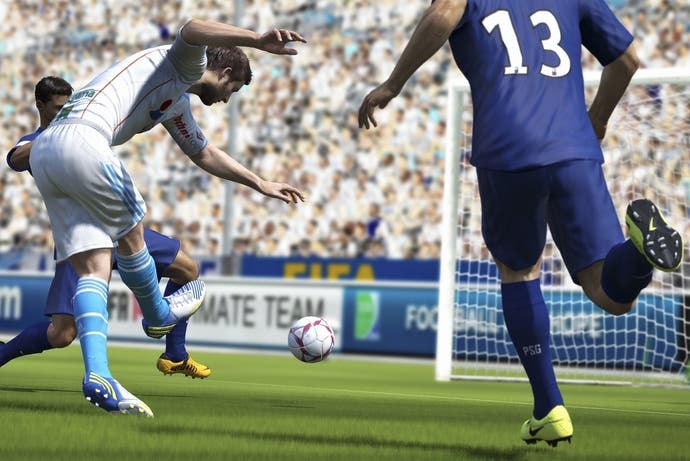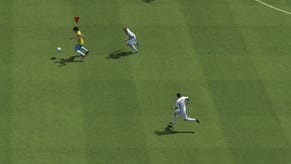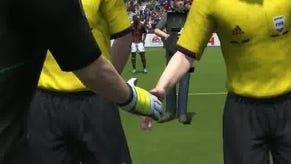FIFA 14 review
Winning without playing well?
For a growing number of people, myself included, EA Sports' goal of forcing FIFA into every gap in our lives has already been achieved. When I wake up I set player auctions on my phone. When I get to work I use the web app to check their progress. At lunchtime I play 2v2 with the guys from sales. When I get home I play a few online tournament games. On slow weekends I throw down some micro-transactions and build a new team. When I'm not doing that, I'm watching YouTubers. (I'm a particular fan of Itani's Five Pack Challenge.)
Ultimate Team is the key - a mode so good that it has become FIFA's most prominent, and so successful that it has propelled EA Sports' Andrew Wilson to CEO of the whole company. For anyone who has never tried it, Ultimate Team involves buying blind packs of cards, which represent players and consumables, and assembling a fantasy team with them. You then take part in tournaments and trade items with other players either in-game or using companion apps. Packs can be bought using in-game currency earned from trades and games played or by spending real money on micro-transactions. All the right licences and slick, gratifying gameplay keep it interesting for months.
Years, in fact. It's often said that people play football games all year round, but I played Ultimate Team in FIFA 13 pretty much until FIFA 14 arrived for review. EA introduces regular new tournaments that coax you into trying new players and team concepts, while special packs are released for sale during happy hour events and the contents of packs are refreshed with upgraded Team of the Week players, nicknamed 'in-forms', throughout the year that follows the game's release. They're rare to come by in packs and expensive on the transfer market, but even if I can't have the card myself, I can still enjoy the likes of IF Aubameyang vicariously through YouTube videos.
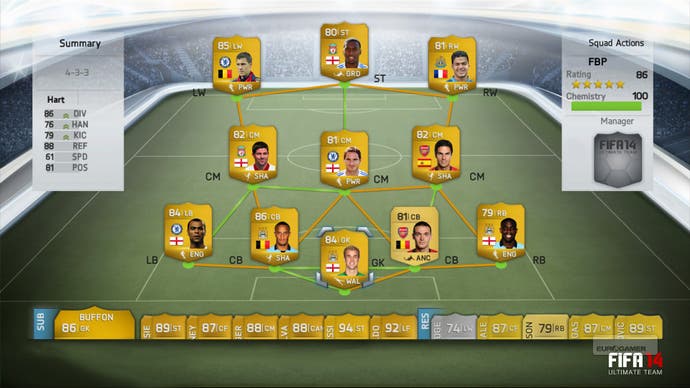
Ultimate Team is a brilliant set of ideas superbly executed, and FIFA 14 does nothing that is likely to break its stranglehold over its fans' time, having been tweaked in appealing but conservative ways. You can now play single matches against random online opponents, for example, and you can search for players by name (in-game at least - you can't in the support apps) and run quick price comparisons on items you want to trade. All are welcome additions, none is particularly exotic.
A bigger change is that formation cards are gone, meaning you can freely experiment with your team's formation without having to buy consumables that change each player's preferred set-up to match your new system. In their place we now have Chemistry Style cards, which boost a few of a player's key stats permanently, allowing you to turn your striker into a battering ram, for example, if that suits your approach.
Really, though, it's much the same mode, except everyone starts from scratch, unable to bring progress forward from FIFA 13. (EA Sports Season Ticket subscribers get a slight boost, at least, with a weekly gold pack and early digital access to the game.) Zeroing everyone's progress again might sound a little cheap in a mode that is clearly designed to extract cash over and above the game's cover price, but hi my name is Tom and I'm an addict.
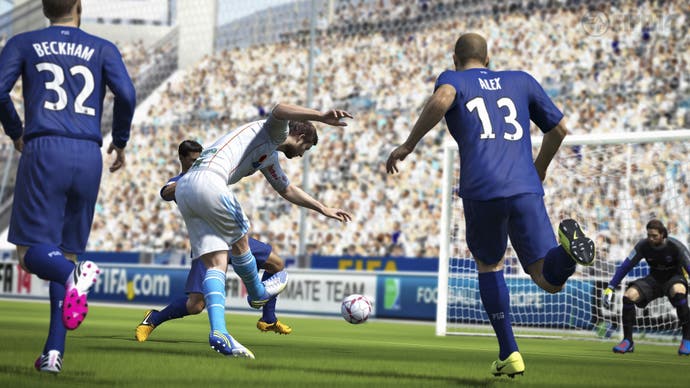
Besides, Ultimate Team's continued appeal is as much about the global fascination with real football as anything. Did you see Ozil's three assists on Saturday? I wonder how much he is trading for? 90k on PS3, by the looks of it. If I can afford him, could I build a decent team around him? To ensure maximum chemistry - the stat that determines how well your AI team-mates anticipate your actions - I'll need fellow Germans, Arsenal or at least Premier League players around him. Might as well buy a couple of gold packs and see what I get.
Barring an unlikely global collapse in the football industry, then, Ultimate Team's continued success and our enjoyment of it should be assured, and the same should be true of matters on the pitch, where FIFA 14 remains a frenzied game full of goals and exciting spectacle and does its best not to break anything as it evolves. There are a few new features, but they are stones tossed into a river rather than a dam set against the flow of existing gameplay.
Ball physics have been adjusted so that aerial passes now have a flatter parabola, for example, often bouncing out of play rather than landing with generous backspin, and you can't get through a match without a dramatic bicycle-kicked clearance from a defender. Presumably both are attempts to reduce the potency of pace and over-the-top passes.
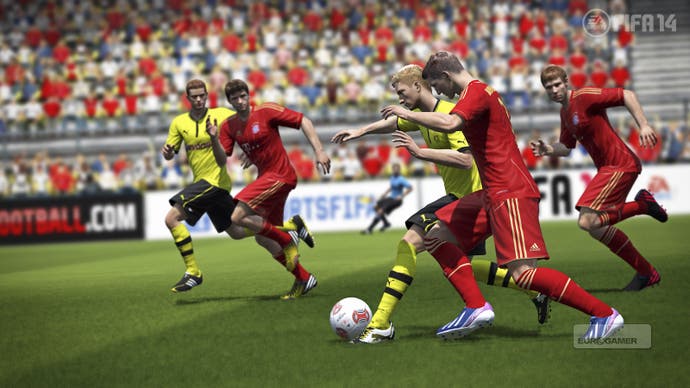
Likewise, the way the defenders react more quickly, closing down the player in possession and putting in a pair of standing tackles rather than a single lunge for the ball, should stop attackers racing past them before they can react. Right-stick trick moves, meanwhile, no longer require you to hold the left trigger, making them more accessible, and the abandoned trigger button is now clamped down to protect the ball under duress. Players also take a little longer to get the ball out of their feet now, and the way they push off with it and accelerate has changed as well. In theory, all of this should slow the game down.
In practice, though, the game pushes back elsewhere. Attackers can now change direction dramatically while sprinting, rather than tracing a predictable arc, while the volume of successful headed goals, chips and finesse shots - those curled efforts that head for the top corner - is higher than last year, so pacey wingers still feel overpowered. This despite stronger, faster defenders and systems supposedly geared towards halting momentum.
For me, the superficial changes are more compelling than these new systems, which are largely forgotten about after a few hours of adaptation. Shooting is probably where the game has seen the biggest infusion of new fun. Technique remains largely unchanged, but the range of contextual shot types is much greater, from dipping volleys to outside-of-the-boot shots with a succulent reverse-swerve. I lost hours in the practice area using Ibrahimovic to bend the ball out-to-in from miles outside the box. It always looks amazing.
FIFA 14 may not be that much better as a game of football, then, but it is a much better spectacle than last year, from overhead kicks in defence and more aesthetically pleasing shots to smaller details, like the way the ball hits the post more frequently, bouncing along the line in desperate search of a tap-in or scrambled save, or new contextual animations, like a defender falling backwards as he heads a goal-bound effort upwards into the net. It's also a much more fluid and dynamic-feeling game, with fewer breaks in play thanks to far more quick free-kicks and throw-ins, and summarisers on the commentary team as well as play-by-play announcers and touchline reporters. The new menus are very nice too.
A lot of this is style over substance, of course, but the truth is that FIFA 14 has plenty of substance as well - perhaps not as much as PES 2014, which takes football more seriously, but enough that you can play it for 12 months without growing too bored of it, sprinting, weaving, crashing into tackles and then showboating in front of your opponent when you score a winning goal, or losing and drowning your sorrows in the Ultimate Team store.
You could argue that FIFA 14 shows EA Sports is running out of ideas, then, but for me this is a developer that knows exactly what it's doing. Neither the football match engine nor Ultimate Team were broken in any major way, and the placebo effect of a suite of control and balance tweaks, along with its increasingly snug ties to the drama of real-life football, will be enough to carry its ever-growing audience of players through the next season. As much as I know I will play it all year, though, I would like to feel a greater sense of progression next time. Hopefully EA Sports will find the next-generation consoles inspiring.
